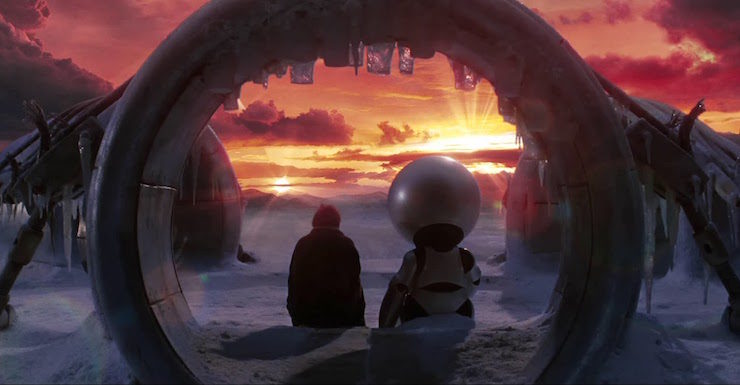In the last ten years or so, geek culture has gone mainstream, with everyone who’s watched a movie from the MCU or played GTA playing a part in the larger movement. But the more fans learn about their particular areas of nerd interest, the more they tend to gain a deeper understanding of how varied and amorphous true geek culture is. Not every nerd loves Doctor Who, and among those who do, choosing “your doctor” can start an ugly fight (and we won’t even get started on the plight of River Song). Star Trek vs. Star Wars could launch a new cold war lasting years.
One of the best parts of the Geek Renaissance is that we’re now able to unabashedly let our nerd flags fly. We’ve found our tribe, and it’s ubiquitous. But until recently, it was tough to know where to look to find accurate depictions of our lives and, shall we say, “particular” interests. We both remember combing through libraries, hoping for any sign that an obsessive love of comics or Jean-Luc Picard didn’t mean we were socially inept weirdos. And as any hardcore geek knows, the representations really have always been hidden in the library books stacks, sometimes proudly announcing their nerdities, and sometimes, disguised in plain sight. Those words and characters have been a homing beacon since childhood, and even with the newly pervasive culture, they bring us back to our first true loves.
Let’s take a look at five books that taught us the true meaning of geek culture.
The Eyre Affair by Jasper Fforde
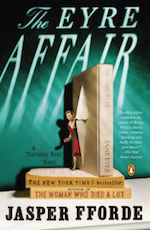 We’d all say we’ve “escaped into” books, but what if we could really do it? Fforde’s Thursday Next is a bad-ass female literary detective working in Spec Ops. She owns an extinct dodo, her husband may or may not exist, and those pesky Mrs. Danvers from Rebecca keep causing headaches. She gives voice to our strange dystopian fears all while being the female near-superhero we always felt we deserved. And the best part of Fforde’s world-building is that Thursday’s geekdom is so intrinsically tied to her persona that it’s never a source of discussion—it just is, which is a powerful message for younger readers.
We’d all say we’ve “escaped into” books, but what if we could really do it? Fforde’s Thursday Next is a bad-ass female literary detective working in Spec Ops. She owns an extinct dodo, her husband may or may not exist, and those pesky Mrs. Danvers from Rebecca keep causing headaches. She gives voice to our strange dystopian fears all while being the female near-superhero we always felt we deserved. And the best part of Fforde’s world-building is that Thursday’s geekdom is so intrinsically tied to her persona that it’s never a source of discussion—it just is, which is a powerful message for younger readers.
Hitchhiker’s Guide to the Galaxy by Douglas Adams
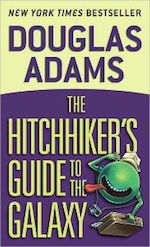 On the other end of the spectrum is the granddaddy of geek, Hitchhiker’s Guide. It isn’t just a touchstone of the culture, it’s also a celebration of it. Arthur Dent has a best friend named Ford Prefect and that doesn’t strike him as bizarre. Sure, he’s dismayed when he discovers the world is about to end, but he catches up to the whole “Don’t Panic” philosophy pretty quick. Trillian gives up an average life to rocket through the stars with an alien moron, and bad poetry is used as a form of torture for the Vogons. And who among us wouldn’t like to build luxury planets in our spare time? Adams created a cast of nerd-tacular characters who wouldn’t seem at all out of place at a con.
On the other end of the spectrum is the granddaddy of geek, Hitchhiker’s Guide. It isn’t just a touchstone of the culture, it’s also a celebration of it. Arthur Dent has a best friend named Ford Prefect and that doesn’t strike him as bizarre. Sure, he’s dismayed when he discovers the world is about to end, but he catches up to the whole “Don’t Panic” philosophy pretty quick. Trillian gives up an average life to rocket through the stars with an alien moron, and bad poetry is used as a form of torture for the Vogons. And who among us wouldn’t like to build luxury planets in our spare time? Adams created a cast of nerd-tacular characters who wouldn’t seem at all out of place at a con.
Hold Me by Courtney Milan
 The very foundation of geekery is fandom … and correcting anyone who is wrong on the Internet. In Hold Me, Maria creates an alias, a blog, and dystopian world that circumvents further disasters using mathematical theories. Of course, her biggest fan on the blog is always ready to point out any holes. A friendship grows though neither reveal their true identity. The twist? Their real-life identities actually do know each other and the hate is strong between them. Hold Me shines a wonderful light on online communities, the friendships outside of that bandwidth, and tackles preconceived notions of geek, nerd, and gender.
The very foundation of geekery is fandom … and correcting anyone who is wrong on the Internet. In Hold Me, Maria creates an alias, a blog, and dystopian world that circumvents further disasters using mathematical theories. Of course, her biggest fan on the blog is always ready to point out any holes. A friendship grows though neither reveal their true identity. The twist? Their real-life identities actually do know each other and the hate is strong between them. Hold Me shines a wonderful light on online communities, the friendships outside of that bandwidth, and tackles preconceived notions of geek, nerd, and gender.
Ghost Story by Jim Butcher
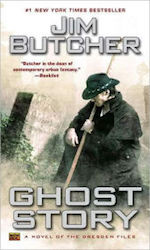 The Dresden Files is filled with geeky Easter eggs, and Harry Dresden is a self-identified one. The series is also filled with fantastical creatures, some good, some bad, some downright evil, and Dresden faces them down with magic and sarcasm. But for several books the reader only gets bits and pieces of his past. Ghost Story is his origin story. Like any superhero worth his salt, both of his parents are dead. A bad wizard raised him, making Harry who he is now—a man who stands for justice. Honestly, out of all the books in the series, this felt like a love letter to fandoms and all things geek.
The Dresden Files is filled with geeky Easter eggs, and Harry Dresden is a self-identified one. The series is also filled with fantastical creatures, some good, some bad, some downright evil, and Dresden faces them down with magic and sarcasm. But for several books the reader only gets bits and pieces of his past. Ghost Story is his origin story. Like any superhero worth his salt, both of his parents are dead. A bad wizard raised him, making Harry who he is now—a man who stands for justice. Honestly, out of all the books in the series, this felt like a love letter to fandoms and all things geek.
Luke Skywalker Can’t Read by Ryan Britt
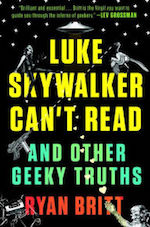 The newest addition to our list, and the only non-fiction entry. Let’s face it, we all have our “rules” about what works or doesn’t work in world-building, either as a reader or a writer. And occasionally, the things we love most (Star Wars, Battlestar Gallactica, Harry Potter) either toe the line of their own rules—or worse, leap into a big bunch of nettled bushes. Britt’s Luke Skywalker Can’t Read is a collection of essays about his life in geekery that are not only funny, but highly relatable to those of us who go crazy over bad ret-con and logic issues (i.e. can Stephen Moffat explain the ins-and-outs of Time Lord regeneration energy, please?).
The newest addition to our list, and the only non-fiction entry. Let’s face it, we all have our “rules” about what works or doesn’t work in world-building, either as a reader or a writer. And occasionally, the things we love most (Star Wars, Battlestar Gallactica, Harry Potter) either toe the line of their own rules—or worse, leap into a big bunch of nettled bushes. Britt’s Luke Skywalker Can’t Read is a collection of essays about his life in geekery that are not only funny, but highly relatable to those of us who go crazy over bad ret-con and logic issues (i.e. can Stephen Moffat explain the ins-and-outs of Time Lord regeneration energy, please?).
Top image: The Hitchhiker’s Guide to the Galaxy (2005)
 Rachel Stuhler, best known for novel Absolutely True Lies and TV movies “Kristen’s Christmas Past” (Lifetime) and “Love Takes Wing” (Hallmark), continues to work in TV and is busy plotting her next move in world domination, or writing about world domination, which is more fun and a lot less work. Melissa Blue’s writing career started on a typewriter (an idyllic situation for a writer if it had been 1985, not 2004), where she penned her first contemporary romance, after which she upgraded to a computer and hasn’t looked back since. Melissa and Rachel, along with Cathy Yardley and Cecilia Tan, are the writers of Geek Actually, which you can read or listen to on SerialBox! Follow them on Twitter @mel_thegreat and @RachelStuhler.
Rachel Stuhler, best known for novel Absolutely True Lies and TV movies “Kristen’s Christmas Past” (Lifetime) and “Love Takes Wing” (Hallmark), continues to work in TV and is busy plotting her next move in world domination, or writing about world domination, which is more fun and a lot less work. Melissa Blue’s writing career started on a typewriter (an idyllic situation for a writer if it had been 1985, not 2004), where she penned her first contemporary romance, after which she upgraded to a computer and hasn’t looked back since. Melissa and Rachel, along with Cathy Yardley and Cecilia Tan, are the writers of Geek Actually, which you can read or listen to on SerialBox! Follow them on Twitter @mel_thegreat and @RachelStuhler.










